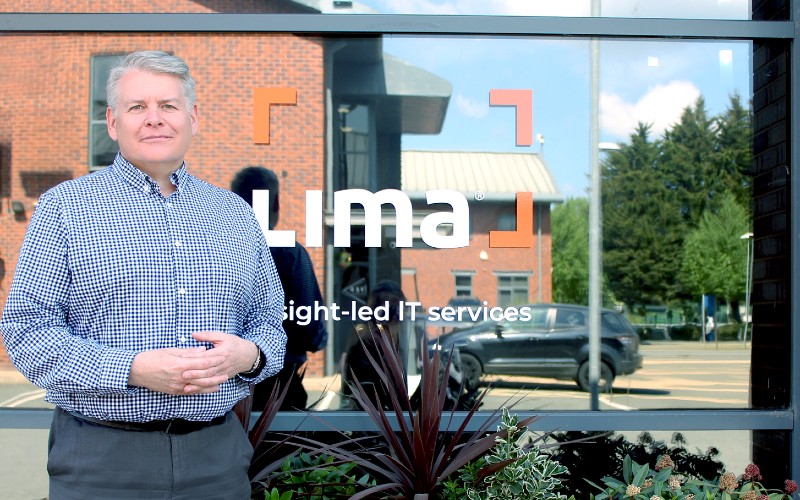Leading a tech business was not the initial plan for LIMA CEO Danny Masters.
The man who now spearheads the Manchester-based managed service provider (MSP) first started out on the customer service desk at BT, supporting end users.
It was here where he discovered a talent for problem-solving and an unexpected enthusiasm for sales.
“I wasn’t sure what I wanted to do at the time, so I joined BT in the customer service team,” he told BusinessCloud.
“I quickly realised that it was something I enjoyed and excelled at.”
Within two years, Masters was managing the team – and soon, the entire call centre.
As the internet emerged, he became involved in BT’s early internet service provider (ISP) projects, working with partners to deliver dial-up internet services.
Recognising his strengths, BT moved him into a full-time sales role, where he thrived. After 12 years though, Masters faced the decision to either stay at BT for the long haul or push for greater responsibility in a smaller, faster-moving business.
That chance came at Star Technology, an ISP and managed services provider, where he spent another 12 years in senior roles, eventually becoming group sales director after its acquisition by Claranet.
Leading two business units and operating at a senior level in an acquisitive business gave him the foundation to step up to CEO.
Entering LIMA at a turning point
In 2022, Masters was offered the chance to lead LIMA, a well-established IT services firm that had recently been acquired by private equity company Maven Capital.
“The business was transitioning from being a VAR – value-added reseller – highly dependent on one-off hardware sales, towards becoming a genuine MSP,” he explained.
“To me it was a brilliant opportunity to put my years of training into good practice.”
Founded in 1997 by Lisa Thornton and Paul Almond, LIMA began life as a hardware reseller operating from home.
It grew steadily into a national player, winning awards from major vendors like HP and NetApp.
However, following its acquisition in 2019, the company began a strategic pivot towards long-term, outcome-driven IT partnerships.
From projects to partnerships
Today, LIMA offers managed services to clients across legal, accountancy, housing and healthcare.
The company helps organisations improve performance, security and productivity by managing IT infrastructure, supporting end users and delivering continuous security protection.
Masters said: “Our differentiator in the market is our focus on business outcomes and business impact, rather than simply on technology.
“We enable our customers to do their jobs, to focus on their business strategy and to be successful.”
The company’s fastest-growing product is its Vulnerability, Detection and Remediation (VDR) service – a proprietary platform that continuously scans across 500+ technologies and provides remediation support.
Microsoft also plays a key role in LIMA’s offering. “They are industry leaders in Modern Workplace and Security, and one of the global giants,” Masters explained.
“Our role is to help customers successfully adopt and understand how Microsoft products can benefit their business. It’s not one size fits all.”
Tackling legacy systems in legal
One sector where LIMA has built strong momentum is legal. Many firms continue to rely on case management systems that struggle to integrate with newer platforms, causing delays, inefficiencies and mounting frustration for fee-earners.
“These systems are the lifeblood of legal organisations, and the end user relies upon them,” said the former BT figure.
“An improvement to these systems can be transformational. We’ve worked with dozens of law firms and delivered system performance improvements of 200–300%.”
Technology is also enabling legal firms to maximise every billable hour, rather than simply growing headcount, but with this comes greater risk.
In 2024, cyberattacks on UK law firms rose by 77% compared with the previous year.
Masters said: “It’s essential that law firms secure against undue exposure to these threats.
“We help legal customers modernise their systems, integrate cloud and AI tools, and ultimately assure clients that their data is secure.”
Rapid growth and private equity support
So far in 2025, LIMA has already signed 12 new customers, with total contract revenue of £7m – exceeding the full-year total for 2024.
Masters is clear, however, that the business model is built for long-term success.
“These managed service contracts take a while to come through to realised revenue,” he explained.
“They’re spread over 36+ month contracts from the point that the service is onboarded.”
Recurring revenues now account for close to 80% of LIMA’s business, up from 40% previously.
The ambition is to win 40 to 50 new customers next year – with the backing of Maven Capital, which is also supporting acquisition plans for the next 12–18 months.
Focus on internal growth and culture
Masters is also passionate about developing talent internally. LIMA recently launched a centre of excellence to support employee development and career planning.
Roles are always offered internally first, giving staff the opportunity to grow within the business.
“There’s something about being in a smaller business that gives people the opportunity to be more dynamic,” he said.
“We’re obsessive about our customers, and the more we can keep our existing staff who understand that obsession, the higher our standards will be.”
This internal culture, he believes, gives LIMA a competitive edge over larger players in the sector.
Building on strong partnerships
LIMA still maintains strategic partnerships with global vendors like Dell and Microsoft, but the company’s offering is now increasingly shaped by its own innovation – including its VDR platform and LIMA Cloud.
Masters noted: “We lean more on our own people now. The landscape is changing, and our customers are changing.
“We’re constantly developing new capabilities to meet that demand.”
From psychiatric nursing to lightning strikes
Masters also revealed that before entering the tech industry, he was training to become a psychiatric nurse in a secure unit – a path he left just months before qualifying.
As if that career switch wasn’t dramatic enough, he added: “I’ve been stung by a jellyfish, stung by a stingray, and struck by lightning.
“Hopefully there’s no more of these trilogy of natural mishaps coming!”
IFX’s Argentex takeover falls through amid administration fears


